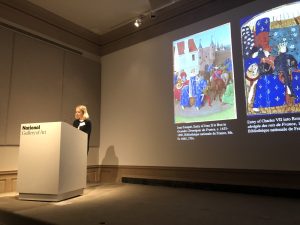MFA candidate Molly English Awarded 2024 MFA Dedalus Award in Painting and Sculpture
Congratulations to Molly English for being announced as a recipient of the 2024 Dedalus Foundation Master of Fine Arts Fellowship in Painting and Sculpture. The MFA Dadelus Awards are given annually to final-year students who are graduating from an MFA degree program in the United States. Four fellowships are awarded every year, each carrying a stipend of $15,000.
Molly English’s tapestries use strategies of narrative tapestry for a reimagining of storytelling through fiber. English refers to Western tapestry’s history of justifying state and religious dominance both in form and content, while rejecting the flattening warp and weft of the loom and embracing the wild textures of the ignoble tufting gun. In material hybridity, the profusion of candy colors, fiber and glittering evoke a sense of domesticity and historic notions of the feminine, into tactile narratives that portray an ecological antithesis to centuries of human-centric, male domination. From English’s own lived and researched understandings of Irish Catholicism, Anarchism, Feminism, and Animism, the works grapple with the fallibility and necessity of liberatory and salvatory beliefs in a nihilistic world.
Molly English (b. 1993) is an artist from Chicagoland. She received her BA in studio art and poetry from Columbia College Chicago in 2016, and will receive her MFA in Studio Art from the University of North Carolina in 2024. In her work, English reimagines the traditional flatness of narrative tapestry as a more abundant form—one that positions faith as both a necessary and fallible mode of relating to an increasingly nihilistic world.











